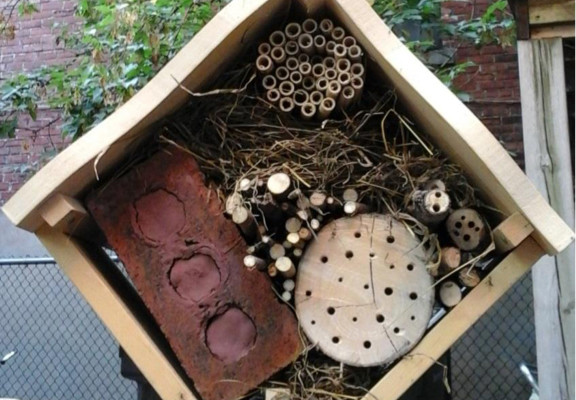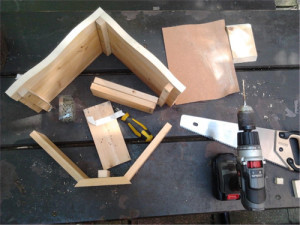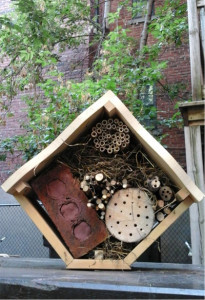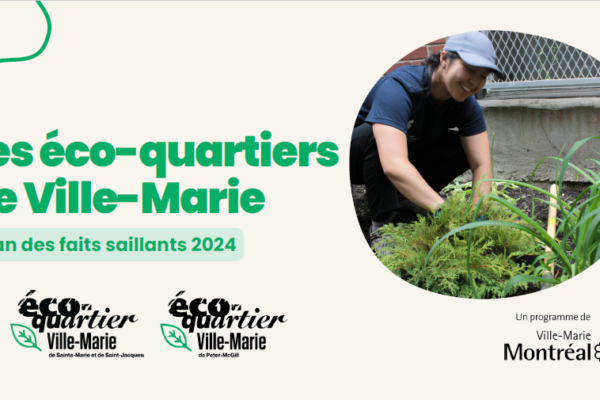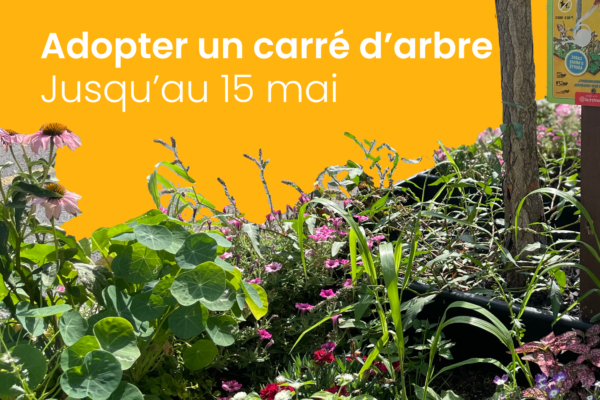A very special hotel is now integrated to the Seymour green alley, located in the quadrilateral streets of Tupper, Seymour, René-Lévesque and Hope. The new construction work, nestled in the corner of a plant bed, provides a nesting area for many beneficial insects.
In urban areas, these insects can only find a few suitable habitat for their reproduction and face many threats. Mineral surfaces such as asphalt and concrete displace their natural habitats where they usually nest. Moreover, pesticides and other chemicals impair the navigational and orientation skills of insects and therefore reduce their life expectancy.
How are these insects beneficial? Mainly because they are excellent pollinators, without which many plant species could not reproduce. They are therefore of a crucial importance for biodiversity. We also take advantage of their pollination services: 75% of the plants producing our food are dependent on pollinators. Without these plants, there would be no apples, no almonds nor tomatoes.
INSECTS ARE IMPORTANT
The presence of beneficial insects is also the best way to reduce pest problems. As natural predators of aphids, scale insects and other unwanted species, they are well appreciated by gardeners!
These days, much attention is given to honey bees from Europe, from which we get honey. The native pollinators, less known, however, are better suited to our native flora and sometimes are much better pollinators!
Everything is about balance in Mother Nature. By destroying the habitats where these beneficial insects usually breed, some less popular insects take over. With the hotel Seymour green alley, we aim to give them a little help so they can help us back in return!
Would you like to build a hotel for your own benefice? Feel free to take inspiration from our hotel and be creative!
Few basic rules
- Use chemical-free materials
- Integrate natural elements such as branches and dead leaves, but make sure beforehand that they are not already being used by insects!
- Protect the hotel in case of rain
- A location facing the sun will promote an early warming in spring. A warm nest is more attractive!
- Elevate the hotel from the ground to avoid attracting bad insects. If you mount it on a pole, coat it with soap. Be observant: the perfect height is the insect flight height.
- Change the stems every year once they have been used. They will not be attractive to new hosts if they have already nests content and they could also transmit disease or host parasites.
- Alternatively, you can insert a piece of parchment paper rolled into the hole, which you can replace every year once it has been used.
BUILD YOUR OWN HOTEL
A shelter against the rain was built from a reused wooden bed frame.
Natural materials were collected on a farm in the outskirts of Montreal. Be careful not to transport ash wood! Holes of different diameters are drilled into the log and larger branches.
Everything is assembled based on the inspiration of the moment, according to some rules stated above. A fence closed the back of the construction and retains the branches that could fall off the back.
- The straw will attract ladybugs and lacewings. Both are extremely fond of aphids, scale insects and potato beetle.
- The branches will attract ground beetles, which will hide underneath. Ground beetles are predators of slugs, aphids, leaf beetles and potato beetles.
- The marrow branches (from elderberry, raspberry, bramble bushes …) attract various hymenoptera (hoverflies, wasps and bees) that dig their nests in the soft wood. Most of the hymenoptera are excellent pollinators. Hoverflies, which are very similar to wasps on at first glance, are also major consumers of aphids.
- Logs with holes in them and hollow stems will be used by bees and solitary wasps to build their nests.
- Bricks filled with clay will host future generations of mason bees, whom are excellent for pollinators of fruit trees.
And lastly, make sure the hotel is installed in a suitable location, and here you go!

